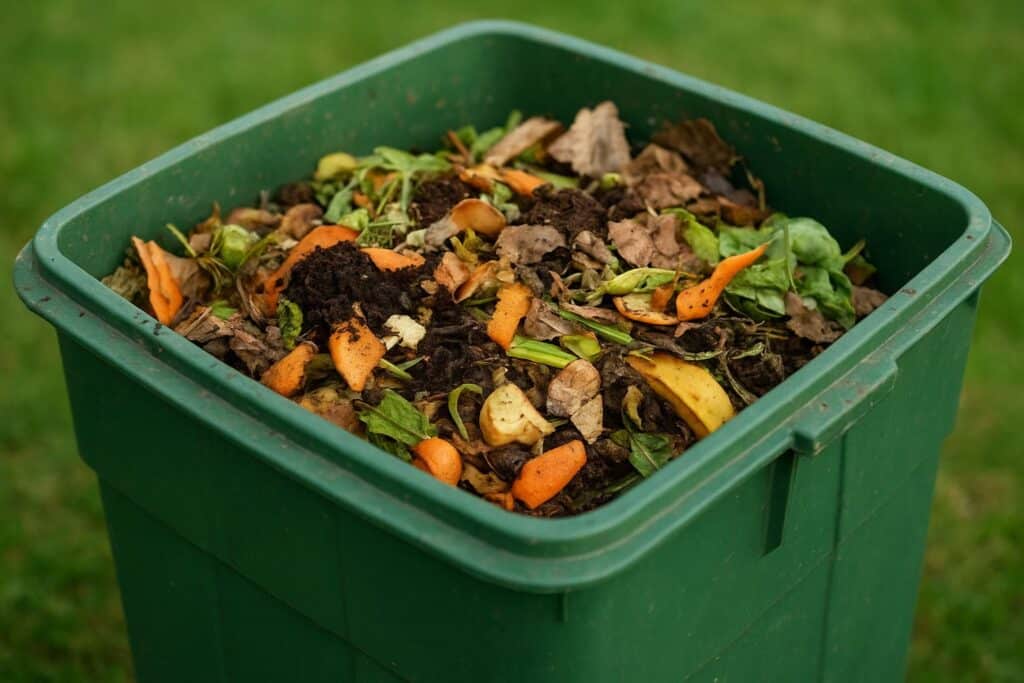Winnipeg households produce kitchen scraps, yard trimmings, and other organic materials every week. When handled right, those materials become compost: a useful soil amendment that improves gardens, reduces landfill methane, and closes a local resource loop. This guide explains
organic waste composting for Winnipeg homeowners, the local options, how to compost at home, how to prepare materials for drop-off, why it matters for climate and soil health, and when a local service like Mr. Garbage is a sensible, safe choice.
Organic Waste Composting Options in Winnipeg
Winnipeg offers several practical routes for organics: backyard composting, city depots that accept food or yard waste, private curbside organics services, and community collection events. The city’s 4R Winnipeg depots and yard-waste programs are the primary municipal channels for household organics drop-off and processing. If you need curbside pickup beyond what your household can manage, private companies provide regular collection and larger-volume solutions.
How those options differ
- Backyard composting is low-tech and keeps small volumes on-site. It’s great for yard waste and many kitchen scraps, but it has limits for cooked food, meat, and pet waste.
- Depot drop-off gives homeowners a place to bring extra yard trimmings and, in some programs, food scraps. Winnipeg’s depots and designated food-waste drop sites list accepted items and rules online.
- Private organics services collect a wider range of food and organic materials, often including cooked food, meat, and dairy, where municipal backyard composting can’t. These services are useful for busy households and for larger cleanouts.
Local note: Backyard composting alone will not divert the majority of organics from landfills. City-level programs and depot networks are designed to capture the larger quantities that households generate. That’s why a mix of approaches works best for a city the size of Winnipeg.
Why organic waste composting matters (environment and practical benefits)
Composting organic waste does three things at once: it reduces landfill methane, returns nutrients to the soil, and cuts the need for synthetic fertilizers. When organic material decomposes anaerobically in landfills, it produces methane, a potent greenhouse gas. Proper composting manages decomposition aerobically, which greatly reduces methane emissions and produces a stable soil product that holds water and supports plant life.
Practical homeowner benefits
- Compost improves soil structure, nutrient retention, and plant health.
- It reduces garden watering needs and helps urban trees cope with drought stress.
- Composting turns what was waste into an on-site resource or a community product for parks and gardens. The Compost Council of Canada summarizes these environmental and agronomic benefits for backyard and municipal composting programs.
A Winnipeg-specific point: organic waste from households accounts for a large share of the city’s municipal waste stream, and improving organic diversion is one of the most effective local actions to cut community greenhouse gas emissions. Practical action at the household level scales up when many people adopt simple routines.
How to compost organic waste at home
Your yard size, family habits, and tolerance for maintenance determine the right composter:
- Tumbler or enclosed bin: fast, tidy, good for small yards, and avoids pests.
- Static pile or open bin: low-cost and effective for larger yard waste, but needs occasional turning.
- Worm bin (vermicompost): excellent for kitchen scraps and small spaces, and produces rich castings for indoor plants or gardens.
Each system needs a balance of “greens” (kitchen scraps, fresh grass clippings) and “browns” (dry leaves, shredded paper, straw). The right balance supports aerobic decomposition and avoids smells. University of Manitoba resources and local master-composter programs give good starter plans and local tips.
news.umanitoba.caWhat to put in (and what to keep out)
Acceptable home inputs
- Fruit and vegetable scraps, coffee grounds and filters, tea bags (without plastic).
- Yard trimmings: leaves, grass clippings, small twigs.
- Shredded paper, cardboard, and natural textiles when free of heavy dyes or synthetic coatings.
What to avoid or handle carefully
- Meat, dairy, and cooked foods can attract pests and may need a municipal or private organics collection route rather than backyard bins.
- Pet waste and cat litter should generally not go in backyard compost because of pathogen concerns.
- Large branches and heavy wood require chipping or staging at a depot for yard-waste processing.
If you plan to compost food scraps that aren’t easy to manage at home, consider a private organics pickup or a municipal depot that accepts a wider range of materials. That approach keeps backyard compost clean and dependable.
Preparing organic waste for drop-off or pickup
Good preparation improves diversion and reduces contamination:
- Keep food scraps in a covered kitchen pail with a liner (paper or compostable bag) or in a small freezer bag for odor control if you’ll store them between pickups.
- Avoid mixing non-compostable materials like plastics or treated wood. Depots and processors reject contaminated loads.
- If you use a private pickup, follow the provider’s sorting rules; they often accept cooked foods and meat, but require clear separation from recyclables and garbage.
These small steps increase the odds that your organics make it to the composting facility instead of being diverted to the landfill due to contamination. Municipal depots publish accepted material lists to reduce surprises at drop-off.
Where Winnipeg processes organic waste, and what happens next
Winnipeg relies on its Brady Road Resource Management Facility and other processing partners to handle yard waste and compostable material from collection programs. Yard waste collected by the city is already processed into compost that meets provincial standards, and new depot and collection options continue to expand capacity. Once organics arrive at a processing facility, they are sorted, shredded, blended, composted under controlled conditions, and screened for a final compost product that can be used in parks and gardens.
City of WinnipegHow processors handle different streams
- Yard waste becomes screened compost used in landscaping and municipal projects.
- Food waste may go to composting or anaerobic digestion, depending on the technology and the site.
- Contaminated loads require separation or diversion to ensure the quality of the compost product.
A transparent chain of custody and audited processors ensure materials are tracked and treated properly. That’s why following depot and pickup rules matters.
Canada.caBenefits of composting organic waste
Household composting and municipal organics diversion produce measurable benefits:
- Soil improvement: compost adds organic matter, improves structure, and increases water retention.
- Climate benefit: diverting organics reduces methane emissions from landfills. Statistics Canada and federal environment agencies highlight the national gains when organic streams are diverted to composting and digestion.
Community benefits
- Reduces pressure on landfill capacity and decreases long-term municipal costs tied to landfill methane management.
- Creates a locally produced soil amendment that supports urban greening and community garden projects.
- Helps reach provincial and municipal waste-diversion objectives when households participate consistently.
Real-world example: a Winnipeg neighbourhood success
In a mid-size Winnipeg neighbourhood, a community association ran a compost-education weekend and set up a shared drop-off area for food scraps. Households were taught simple rules (liners, no meat in backyard bins, freeze scraps if needed). Over time, volunteers noted fewer smells and fewer contaminants in the shared pile. The neighbourhood used the finished compost in planters for a local park, a small loop that turned once-problematic waste into visible value. Local examples like this show how small, coordinated actions scale up in cities. (Example adapted from local program practices and community compost initiatives.)
Expert voice: “Household routines make the system work,” says a local waste-systems consultant. “When homeowners sort at source, depots and processors can do their job efficiently. That’s good for gardens and good for emissions.”
When to choose a private organic pickup
Private pickup services like Mr. Garbage fill gaps municipal options may not cover. They are useful if you:
- Want a regular collection for food scraps that your backyard composter can’t handle.
- Are you doing a large yard cleanup, landscape project, or renovation that produces large volumes of compostable material?
- Prefer a hands-off option because of mobility, time, or convenience.
Mr. Garbage offers scheduled pickups, secure routing to approved processors, and guidance on what to separate and how to prepare materials. Using a reputable local provider keeps organics moving through the correct waste streams and prevents contaminants from spoiling the composting process. Mentioning Mr. Garbage here reflects a practical service homeowners use when depot trips aren’t the easiest option.
compostwinnipeg.caHow to start: A simple four-step plan for homeowners
- Choose your system: backyard composter, worm bin, or private pickup.
- Set a small kitchen station: a covered pail or freezer bag for scraps, and commit to a short weekly routine.
- Learn the do’s and don’ts: avoid plastics, large bones, and pet waste in backyard systems.
- Use local depots or a pickup service like Mr. Garbage for materials your home system won’t accept.
A small, steady routine makes composting feel easy instead of like one more chore.
How communities track organic waste composting
Municipal and federal agencies monitor diversion rates, tonnages sent to composting or digestion facilities, and participation in curbside or depot programs. National surveys show a steady rise in household composting, and provincial strategies set targets for capturing more food and yard waste. Local tracking helps identify contamination trends and where education or service changes are needed. When many households act together, the city’s diversion numbers improve, and the benefits become more concrete.
Statistics CanadaConclusion
Organic waste composting is one of the simplest, most impactful actions a Winnipeg homeowner can take. Whether you start with a backyard bin, use depot drop-off, or
schedule a private pickup, every kitchen scrap and leaf you divert helps reduce methane, improves local soil, and keeps useful material circulating in the community. If a depot trip isn’t practical or you need help managing volume, Mr. Garbage provides a straightforward pickup service and guidance to make sure organics reach certified processors.
Ready to start composting or need help clearing yard trimmings and food scraps responsibly? Visit
Mr. Garbage to schedule an organics pickup or get advice on the best composting option for your home. Let’s make Winnipeg greener, one peel and leaf at a time.
Frequently Asked Questions (FAQs)
Q1: What is organic waste composting, and why should I do it?
A1: Organic waste composting converts kitchen scraps and yard waste into stable compost that improves soil and reduces landfill methane. It saves resources, improves gardens, and supports local waste-diversion goals.
Q2: Can I put cooked food and meat in my backyard composter?
A2: Generally, meat and cooked foods attract pests and are not recommended for typical backyard compost systems. For those materials, use a municipal depot or a private organics pickup that accepts a wider range of organics.
Q3: Where can I drop off yard waste and food scraps in Winnipeg?
A3: Start with the City of Winnipeg’s 4R depots and designated food-waste drop-off locations. Check depot pages for accepted items and hours before you go.
Q4: How do I reduce smells and pests in my home composter?
A4: Keep a balance of greens and browns, cover fresh food scraps with dry leaves or shredded paper, use a covered bin or tumbler, and consider freezing scraps between pick-ups to limit odours.
Q5: Can Mr. Garbage collect organic waste from my home?
A5: Yes. Mr. Garbage offers organics pickup and bin services for homeowners who prefer a scheduled collection. They route materials to approved processors and guide preparation and separation.

